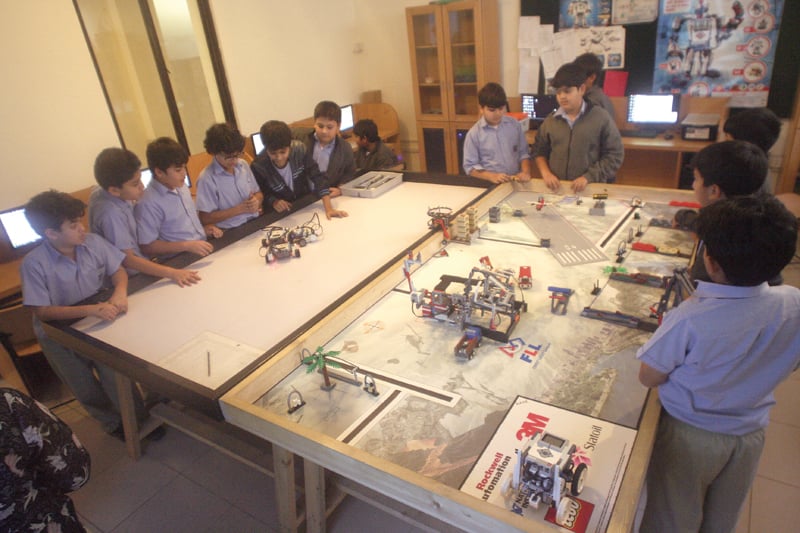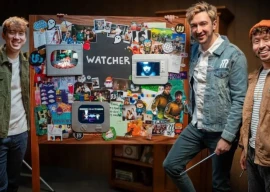
The school, which expanded into an O’ level institution in Defence Housing Authority’s Phase VIII from a well-known pre-school institute, Mrs Haque’s Nursery, was envisaged with the ‘SPARC’ - acronym for Special Programmes Amongst Regular Classes. The plan was to develop varied skills, interests and abilities in the students.
“The programme is designed to cater to different talents and skills,” said Saubia Fatemi, the admissions and special programmes director at the school. The idea is certainly unique as the school offers robotics courses for students as young as eight years of age.
Apart from robotics, the school has, over the years, begun to offer 15 more classes in diversified fields, ranging from gymnastics, yoga, tae-kwon-do, rollerblading, dance and cooking, to photography, journalism, creative writing, comic illustration, textile design and mobile apps and game development.

At the full-of-activity classrooms at Haque Academy, students experiment in building the elementary form of LEGO-based robots with inclusion of gears and motors. The students employ their imagination and logic by means of Scratch – software developed by Massachusetts Institute of Technology for young children to be able to programme with drag-and-drop blocks - to interact with the LEGO WeDo™ kit. PHOTOS: ATHAR KHAN/ EXPRESS
“Each person has different skills and abilities as not everyone is a doctor or engineer,” explained Fatemi. “You always come across students who may not be very good in the classroom but are very good athletes, artists, journalists or photographers.”
Understandably, the school had received quite a mixed reaction from parents when the programme, in the academy’s first year, was acted out between the regular classes. “Some parents thought it was wonderful while others did not really understand the need to do this, registering their concerns about taking the children away from academics,” said Fatemi. “We can very confidently say that the parents love the programme now.”
She believed that they have seen those positive changes taking place in their children that the school had intended to bring in with the integrated curriculum. “The aim is not to remove the academics but to connect the academics with the real-world in an altogether different way.”
For instance, robotics involves a lot of academics but it does not require sitting with the textbooks and memorising your notes for the exam. It is about literally putting your hands in it, connecting and building, she explained.
Parents like Momina Hassan, mother of two, felt more satisfied with the way her children were essentially enjoying these courses and also learning about themselves and their skills. “I feel very proud when I find them [her children] participating in informed discussions with adults on topics that other children of their age do not really know anything about,” she said.
Winning the laurels
These opportunities of learning are not just limited to the classroom. Students from grades 10 and 11 are actually taking part in regional and national competitions, where they meet fellow techies, athletes and artists and put their abilities to the test. In 2012, the students of the academy participated in the FIRST LEGO League (FFL) - a competition that is held in 70 countries at a regional, national and subsequently at a global level.
At the regional competition, the academy’s students secured two trophies, each in the robot design and robot game categories. They continued to the national championship where they secured another trophy in the robot design category. One of the participating students was also offered a mentorship position to work with regional FLL partners to train the teams in making dynamic robot models.
In 2013, robotics students participated in the Students’ Engineering Exhibition 2013 organised by the Pakistan Air Force-Karachi Institute of Economics and Technology (PAF-KIET), where they competed against high school and graduate level students and secured the best project award in the junior project design category.
Robotics 101
At one of the full-of-activity classrooms at Haque Academy, Shaista Imran was surrounded by a bunch of excited students, experimenting in building the elementary form of LEGO-based robots with inclusion of gears and motors.
Students participating in the course were asked to make a robot perform certain behaviour. First, they must brainstorm and design a robot which is able to meet the needs of the task. After much deliberation and discussion, a prototype is built, and then the programming phase starts. Students must be able to think logically, and consider a variety of scenarios and outcomes. During this whole process, students are introduced to the laws of physics, mechanics and maths.
“As I started implementing different concepts in the class, the ideas went on popping into my head that approaching one thing can be done in multiple ways, requiring different levels of intellectual growth and expertise,” explained Imran. “For example, I learnt to approach the same concept at different levels, each for the students in grade five, six and in higher grades.”
In this manner, the students will develop their technology, engineering, scientific, mathematical and thinking skills through hands-on experience that relate back to the real world using industry standard software and realistic models.
For Asma Sikandar Gulbaz, another robotics and technology instructor at the school, the exposure to technology at junior grades helps the students acquire effective logical skills and analytical reasoning.
She explained that the students employ their imagination and logic by means of Scratch - software developed by Massachusetts Institute of Technology for young children to be able to programme with drag-and-drop blocks - to interact with the LEGO WeDo™ kit.
The toolkit produced by LEGO for the educational
market, arguably the youngest level of robotics sets, allows children to connect motors and sensors to other LEGO bricks and gears.
Published in The Express Tribune, February 20th, 2014.











































COMMENTS (2)
Comments are moderated and generally will be posted if they are on-topic and not abusive.
For more information, please see our Comments FAQ